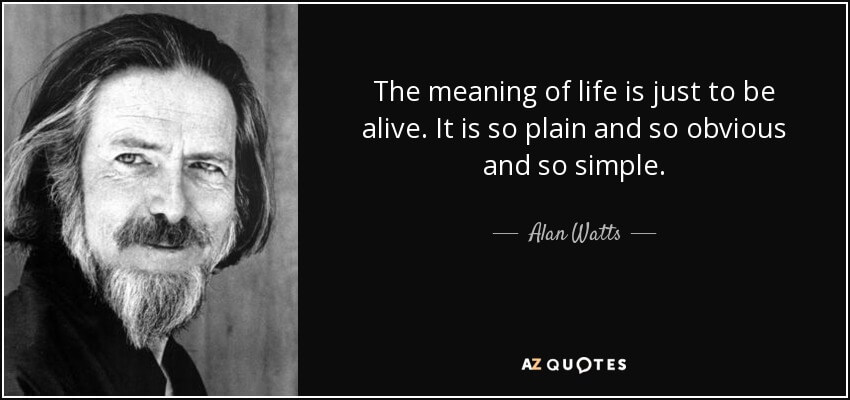
Alan Watts was a philosopher who synthesised ancient Eastern wisdom into meaning relevant for living in modern Western society.
He died at the age of 58 in 1973, yet now he is more relevant than ever. As Erik Davis said, his “writings and recorded talks still shimmer with a profound and galvanizing lucidity.”
We live in a modern age of ever more intense work and less and less play, where business leaders feel they have to process more and more information and make more and more decisions.
Management is about DOING, but Leadership is about BEING, so Alan Watts is wonderful reading.
All leaders could benefit from the words of Alan Watts, but as this is a short post and most Leaders won’t make time for what these days is actually called a “long read” (you see how many posts and articles actually tell you how long it will take to read it, as we don’t have the time ? )… I will only give a few quotes, then a (only 4 minutes!) video of breathtaking beauty, with the transcript for the video underneath.
Quotes from Alan Watts
“This is the real secret of life — to be completely engaged with what you are doing in the here and now. And instead of calling it work, realize it is play.”
“The meaning of life is just to be alive. It is so plain and so obvious and so simple. And yet, everybody rushes around in a great panic as if it were necessary to achieve something beyond themselves.”
“The only way to make sense out of change is to plunge into it, move with it, and join the dance.”
“We are living in a culture entirely hypnotized by the illusion of time, in which the so-called present moment is felt as nothing but an infinitesimal hairline between an all-powerfully causative past and an absorbingly important future. We have no present. Our consciousness is almost completely preoccupied with memory and expectation. We do not realize that there never was, is, nor will be any other experience than present experience. We are therefore out of touch with reality. We confuse the world as talked about, described, and measured with the world which actually is. We are sick with a fascination for the useful tools of names and numbers, of symbols, signs, conceptions and ideas.”
Transcript :
The existence, the physical universe is basically playful. There is no necessity for it whatsoever. It isn’t going anywhere. That is to say, it doesn’t have some destination that it ought to arrive at.
But that it is best understood by the analogy with music. Because music, as an art form is essentially playful.
We say, “You play the piano” You don’t work the piano. Why? Music differs from say, travel. When you travel you are trying to get somewhere. In music, though, one doesn’t make the end of the composition, the point of the composition. If that were so, the best conductors would be those who played fastest. And there would be composers who only wrote finales. People would go to a concert just to hear one crackling chord… Because that’s the end!
Same way with dancing. You don’t aim at a particular spot in the room because that’s where you will arrive. The whole point of dancing is the dance.
But we don’t see that as something brought by our education into our conduct. We have a system of schooling which gives a completely different impression. It’s all graded and what we do is put the child into the corridor of this grading system with a kind of, “Come on kitty, kitty.” And you go onto kindergarten and that’s a great thing because when you finish that you get into first grade. Then, “Come on” first grade leads to second grade and so on. And then you get out of grade school and you got high school. It’s revving up, the thing is coming, then you’re going to go to college… Then you’ve got graduate school, and when you’re through with graduate school you go out to join the world.
Then you get into some racket where you’re selling insurance. And they’ve got that quota to make, and you’re gonna make that. And all the time that thing is coming – It’s coming, it’s coming, that great thing. The success you’re working for. Then you wake up one day about 40 years old and you say, “My God, I’ve arrived. I’m there.” And you don’t feel very different from what you’ve always felt.
Look at the people who live to retire; to put those savings away. And then when they’re 65 they don’t have any energy left. They’re more or less impotent. And they go and rot in some, old peoples, senior citizens community. Because we simply cheated ourselves the whole way down the line.
If we thought of life by analogy with a journey, with a pilgrimage, which had a serious purpose at that end, and the thing was to get to that thing at that end. Success, or whatever it is, or maybe heaven after you’re dead.
But we missed the point the whole way along. It was a musical thing, and you were supposed to sing or to dance while the music was being played.
